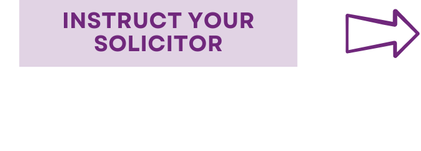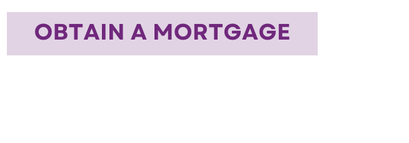Buying a property, whether it’s your first time, or you are well versed with the experience, can be a daunting and stressful time. This guide has been written to provide you with an easy-to-follow insight into the end-to-end process of buying a property, we’ve also included helpful information about timescales, owning a property jointly, and being in a chain. Of course this is just a guide and every property purchase is different, that’s why we’re always on hand to help guide you along the way. Click on each of the stages below to find out more.

In England and Wales, the process of buying a house starts with you making an offer, usually this is done via an estate agent. The sellers of the property will either accept your offer, or will try and negotiate a higher price with you. Once a price has been agreed you have purchased the property ‘sold subject to contract’. It is important to note that this isn’t legally binding until exchange of contracts happens, so there is a chance that either party can pull out of the sale.
Sold subject to contract means that you have agreed to buy the property at the price negotiated. A sold sign will usually be displayed and all parties can proceed to the next step. Being ‘sold subject to contract’ does not mean that either party are tied in to the transaction. You do not become ‘tied in’ until exchange of contracts has taken place.
As soon as your offer is accepted. Early instruction helps avoid delays and allows your solicitor to start legal work right away.

Once you have agreed a price for the property you should instruct your solicitor as soon as possible so that work can commence straight away. Buying a selling property can be a lengthy process so the sooner work can commence then better.
You can obtain a detailed quote from us by calling one of our offices and speaking to our new clients team (option 1 on the phone) or using our online calculator. When you receive your quote, you can instruct us by either clicking the button in the email we send, or simply call us to tell us you wish to go ahead.
Aside from the price of the property, remember to budget for:
– Legal fees and disbursements (searches, Land Registry etc.)
– Stamp Duty Land Tax (or equivalent in your region)
– Mortgage-related fees (application, valuation)
– Survey fees
– Insurance and removal costs
Freehold:
– You own the property and the land it sits on outright.
– You are responsible for maintaining the property (e.g. roof, walls, garden).
– There are no ground rents or service charges (unless it’s part of a managed estate, e.g. a lot of new builds these days).
– Most houses are sold as freehold.
In short: You’re the full legal owner with no time limit on your ownership.
Leasehold:
– You own the property for a fixed number of years (the lease), but not the land it’s built on.
– The land is owned by the freeholder, who may charge ground rent and service charges.
– You may need permission for alterations (like installing a new kitchen or subletting).
– If the lease gets too short (typically below 80 years), it can affect property value and mortgage options.
– Most flats/apartments are leasehold, and some new build houses may be too.
In short: You own the property, but not the land – and your ownership is time-limited.
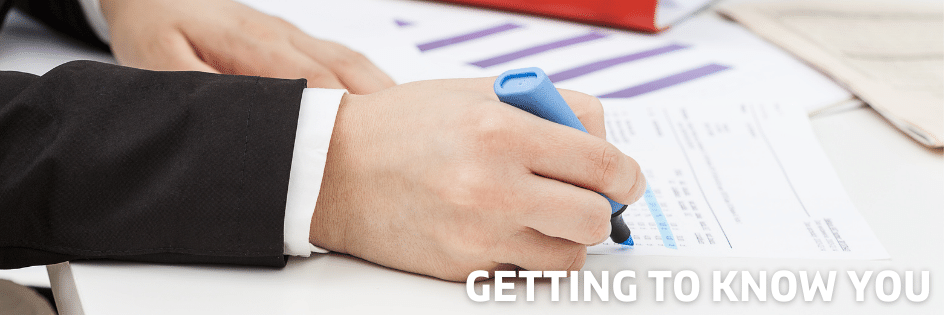
As solicitors, we have a duty to make sure that you are who you say you are in order to prevent fraudulent activity and money laundering, so we will ask you for some additional information to help us to do that. We also need to establish your identity which we usually do via an App, but if you do not have access to a smart phone, or are not able to use the technology, then we can agree other ways to identify you. Just contact your assigned lawyer and we will arrange that with you.
We will also need to check your ‘source of funds’. This may mean asking you to show us banks statements showing the money in your account (usually going back at least 6 months) or seeing bank statements for someone who is gifting you the money. If the money is being gifted, we will also need them to sign a declaration that the money is a gift and not a loan.
This basically means knowing and proving how you are intending on paying for the property. Often this is a combination of a mortgage and savings, or it might be that someone is gifting you the money for a deposit, or you are selling another property to part or fully fund the buying of a new one. Whichever way you intend on paying for the property, we need to see evidence of how you are doing that.
As your solicitor, we’re legally required to carry out anti-money laundering checks, which includes verifying where your money is coming from. This helps protect against fraud and financial crime, and it’s a requirement under UK law for all property transactions. We understand this can feel a bit personal, but rest assured your information is handled confidentially, and we only ask for what’s necessary. If you’re unsure what to send, just ask – our team is here to help.
The collection of this information is required by law, can be time consuming, and may seem intrusive. Please patient with us. As solicitors we are regulated by professional bodies and must comply with these regulations in order to protect us all from criminal activities.
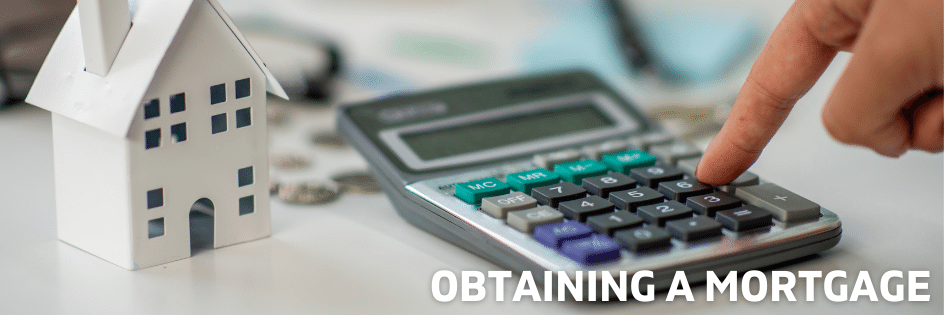
Your lender will want to know who your solicitor is so you will need to provide them with our details so that they can send us your mortgage offer once it has been processed. We are on the approved panels for most mortgage lenders but please call us if you are using a lesser known lender and need to check.
If you need to get a mortgage to buy the property then you should contact either a Mortgage Broker or a Bank or Building Society straight away. Often waiting for a mortgage offer to be issued is the thing that holds up a transaction and so the sooner you start that process the better.
Most lenders will do a basic valuation, but this is often a desktop one, so no one will physically see the property. We recommend getting an independent survey (such as a HomeBuyers Report) to give you a detailed picture of the property, like damp, structure, or expensive repairs, which helps you avoid costly surprises later on. It’s strongly recommended for older or potentially problematic properties for peace of mind about the property’s condition.
When you are using a mortgage to fund/part fund the purchase, we must act on behalf of the mortgage company as well as for you. This means that on occasions we must refer matters to the lender to approve before we can proceed. This can be something like access issues on the property, lack of building regulations consent for some work that has been done on the property, or seeking the lender’s approval for a gifted deposit.

In addition to the identity and source of funds information, we need further information from you to get the process started. Sometimes the paperwork and detail being asked for can feel a little daunting, but buying a house is a legal transaction and as such it is very important that the information we collect is both accurate and detailed. Please feel free to call us if you need any help filling out the forms we send you. We will also provide documentation to you which sets out the work that we will do, and our Terms of Business, and will ask you to sign a document to confirm you agree to the terms. The forms can be completed via email, or we can print them out and either post them to you or you can collect from any of our offices.
We also need £300 on account of costs from you. This is taken at the start of the transaction to cover the initial costs that we spend, for example searches, and will be deducted from your final fee at the end of the transaction. Please send this to us as soon as possible, as we cannot begin without it. The details will be on the bottom of your Client Care Letter.
– Purchase Questionnaire. This tell us basic information about you and the purchase you have agreed to, and helps us to know what is important to you.
– Source of Funds Questionnaire. This helps us to understand how you are intending on funding the purchase.
– Stamp Duty Questionnaire. This helps us to be able to make sure you are paying the correct amount of tax (known as Stamp Duty, Stamp Duty Land Tax, and SDLT) on the purchase of the property so that you don’t get a nasty surprise from the Inland Revenue afterwards.
– Buying Together Form. This form collects details of any additional people who are buying the property with you (see the section below on joint ownership of property).
– Client Declaration. This confirms that you agree to our terms of business and client care letter, containing the scope of the legal work and fees.
– Client Care Letter which sets out the scope of the legal work & our fees
– Our Terms of Business
– Guidance on avoiding payment/fraud issues
– Instructions for identity checks
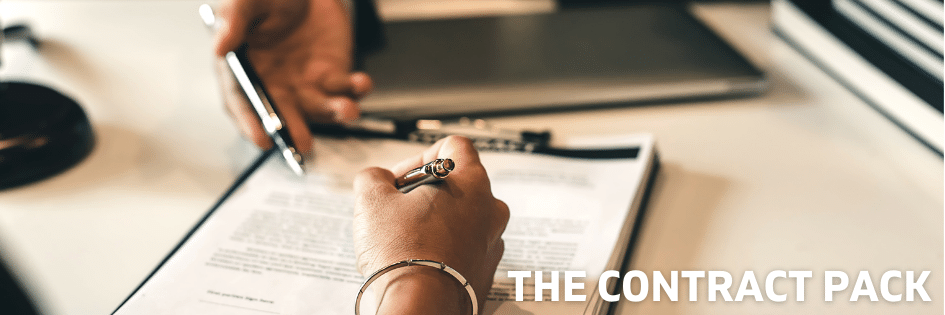
Your sellers will also be instructing their own solicitor to represent them. The seller’s solicitors will prepare and send to us a ‘contract pack’. This will include a contract for sale which sets out the agreed price and deals with matters such as the amount of deposit to be paid and any money being paid separately for fixtures and fittings. It also contains clauses about what happens if things go wrong once contracts have been exchanged.
This contract is sent to us along with any other information the sellers have about the property you are buying. They will also send us the details of the registered title to the property. We need this information before we can apply for your searches.
We will also receive some other documents from your seller’s solicitors which form part of the legal contract. These are:
- Fixtures & Fittings Form. This forms part of your contract with the sellers and tells everyone what is included in the sale and what is not. It includes items such as appliances, soft furnishings, and garden furniture like benches and greenhouses.
- Property Information Form. This also forms part of your contract with the sellers and tells us important information about the property which we need to know, for example if there have been any disputes over the property, or any work carried out at the property.
We will send you a copy of the forms and other relevant documents for you to check and if you have any questions from them, let us know!
The Contract Pack is a bundle of legal documents that your solicitor receives from the seller’s solicitor. It forms the legal foundation of the transaction and tells us everything we need to know about the property you’re buying.
Typically, the pack will include:
– A draft contract (the proposed legal agreement for the sale)
– A copy of the title deeds or title register (proof the seller owns the property)
– A copy of the title plan (shows the boundaries of the property)
– Property information form (information about the property you are buying)
– Fixtures and fittings form (what’s staying and what’s being taken)
– Any relevant planning permissions, guarantees, or building regulations certificates
Once we receive it, we’ll:
– Review it in detail to check for any issues or missing information
– Order searches based off of the Title Plan
– Raise enquiries (questions) with the seller’s solicitor if anything is unclear
– Report back to you in plain English so you understand what you’re buying
– Make sure the contract terms are fair and accurate
No need to read everything yourself, we do that for you. We’ll send you the forms to look through to check in case you wish to query anything in the enquiries. We will then send a summary report highlighting anything important you need to know and explain it clearly. Of course, you’re always welcome to ask questions if you’d like to review specific parts.

As soon as we have received the contract pack from the seller’s solicitors and £300 on account of costs from you, we will apply for your searches.
Property searches are legal checks we carry out with local authorities and utility companies to uncover important information about the property. They help us spot any issues that might affect your future use or enjoyment of the home e.g. planning restrictions, flood risks, or nearby developments.
They’re essential for protecting you, and if you’re getting a mortgage, your lender will require them too.
– A local search from the local authority where the property is based. This will show us various things including any planning permission or Building Regulations consents which have been granted over the property, the adoption status of roads in the area, and even the radon levels in the area.
– Water & drainage search. This tells us about the sewage and water system at the property.
– Coal mining search. This shows us whether the property is likely to be affected by past or present mining.
– Environmental search (optional). This will show us contaminated land risk, flood risk, ground stability, more detailed radon checks, energy infrastructure, transportation (e.g. HS2), protected areas. This search is optional and not included in the initial quote. We will ask you as part of the questionnaire whether you want this additional search or not.
On average, searches take 2–3 weeks, but this can vary depending on the local authority’s turnaround times. We order them as early as possible to avoid delays and will keep you informed while we wait for results.

Once we have received the contract pack and the results of your searches we will study them in detail and will ‘raise enquiries’. This just means we will ask questions if anything is unclear or needs clarifying, or will ask for additional documentation in order to make sure your position (and that of your lender) is protected.
Enquiries are follow-up questions we send to the seller’s solicitor after reviewing the contract pack and search results. They help clarify anything that’s unclear or potentially concerning about the property e.g. missing paperwork, shared access, or building work with no evidence of planning permission. It’s a normal and important part of the legal process, and it’s how we help protect your interests.
We might raise enquiries about:
– Planning permissions or building regulations for extensions or alterations
– Who maintains shared spaces or boundaries
– Guarantees or warranties (e.g. for windows, roofing, or damp treatment)
– Disputes with neighbours
– Missing documents like title plans or certificates
Our goal is to make sure you know exactly what you’re buying and aren’t left with any nasty surprises.
That depends on how many there are, and how quickly the seller and their solicitor respond. It can take anywhere from a few days to a few weeks. We follow up regularly and will keep you updated throughout so you’re never left wondering what’s happening. We might go a bit quieter at the point of enquiries whilst we go back and forth to clarify things.
Part of our job is to make sure you know what you are buying, and that we make sure you are not at risk of taking on a liability for something you have not done. An example of this could be whereby the sellers have built an extension to the property, however the sellers have not fully complied with the terms of the planning permissions granted. In this example, were you to purchase the property, you would carry the risk of the local authority returning in the future to either request the works be changed in order to comply with the terms of the initial planning permission, or worse still, have the extension demolished.
Most problems can be resolved, they often just take some time to investigate. We will ensure you are clear on the exact status of the property you are proposing to purchase and any risks involved. These enquiries can take some time and a bit of back and forth to get to the bottom of a situation, but they are extremely important.
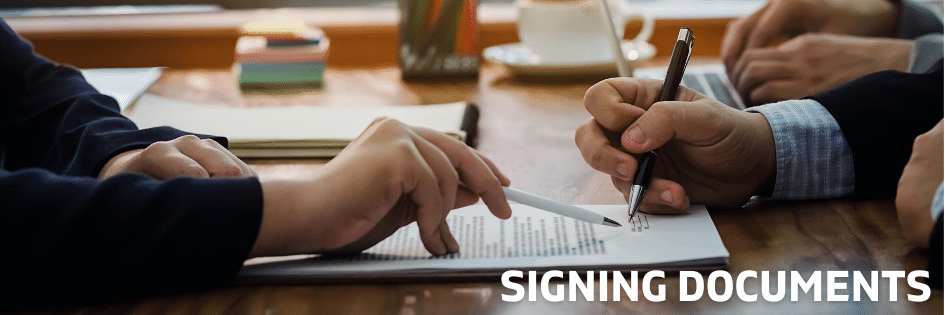
Once all the enquiries have been responded to satisfactorily we will then be in a position to report to you with all of the information you need to know, and get you signed up ready for exchange of contracts and completion. We will also send you a completion statement at this point, this gives you a breakdown of all of the money involved in your purchase, including exactly what you need to pay and where all the funds are going.
We will need to send you some documents to sign and will need these back with us before we can proceed to exchange contracts. These will usually be the Contract and Transfer (which is the document that passes the ownership from you to your buyers once your sale has completed) and a Mortgage Deed if you are getting a mortgage. Please note, you should not date any of the legal documents.
A property report is a summary we prepare for you after reviewing all the key documents, like the contract pack, searches, and replies to enquiries. It brings everything together in one place so you can make an informed decision before you commit to buying.
We write the report in plain English, and we’re always happy to talk it through with you. It’s a vital part of the process and it helps make sure there are no surprises after you move in.
The report will include things like:
– A summary of the legal title (who owns the property and any restrictions)
– Results from the searches
– Any concerns or risks we’ve identified
– Details of what’s included in the sale (e.g. fixtures and fittings)
– Any legal rights or obligations that come with the property (like shared driveways or maintenance responsibilities)
Think of it like a final invoice, it pulls together the full financial picture of your transaction so you know what’s due before completion day.
Your completion statement will typically include:
– Purchase price of the property
– Deposit amount (what’s already paid and what’s still due)
– Legal fees and disbursements (like searches and Land Registry fees)
– Stamp Duty (if applicable)
– Any mortgage funds being received from your lender
– The final balance you need to transfer to us before completion
We’ll send your completion statement in advance and guide you through it. It’s important to send your final funds to us in good time to avoid delays on completion day.
The date on the Transfer, Contract and Mortgage Deed makes them legally binding, and it must only be added at the point of exchange, when both parties are ready and all legal checks are complete.
If you date the contract too early (even by accident), it could create a binding agreement before you’re fully protected. It also means that we don’t have to get the documents resigned, should the completion date change before we have exchanged.
To keep everything valid and in your best interests, we’ll insert the date upon exchange of contracts, once all conditions have been met and you’ve given us the go-ahead.
Some of the documents, such as the TR1 and Mortgage Deed, require a witness to sign as well. This helps prove that you signed the document yourself and that it wasn’t altered later.
Your witness must:
– Be over 18
– Be independent (not a spouse, partner, or relative, or anyone named in the document or related paperwork)
– Be physically present with you when you sign
Think of a neighbour, work colleague, or friend who fits the criteria.
Once you’ve signed in front of them, they’ll need to:
– Sign their own name
– Print their full name
– Provide their address and occupation

Once we have the following in place, we can proceed to exchange of contracts:
- Your mortgage offer (if applicable)
- Satisfactory answers to all our enquiries
- Your signed documents
- Your deposit.
The deposit is often a percentage of the purchase price, usually 10%. This deposit can be funded from cash you hold in your bank or savings account, however on occasions, you may need the funds from the sale of your property to pay the deposit. In such situations the deposit is usually a fixed amount which is determined by the first transaction in the chain. That way, were there to be a breach of contract after exchange of contracts has occurred, all persons’ liability in the chain is the same amount.
The exchange of contracts is, in essence, a legally binding promise for the sellers to sell their property and for you, the buyers, to buy the property. You will also be agreeing and committing to a completion date when you exchange contracts which cannot be changed, and allows you to all plan your move such as finalising your packing, putting insurance in place, agreeing dates with removals companies, and termination of any services such as Broadband and Sky TV.
At any point before exchange of contracts, either you or your sellers could pull out of the transaction. Once contracts have been exchanged, pulling out of the transaction cannot happen without financial penalty.are exchanged, both parties are legally committed to completing the transaction. If either side backs out, there can be financial penalties.
No, you don’t need to be physically present for exchange of contracts. We handle the exchange for you, usually over the phone with the seller’s solicitor. You’ll just need to have signed the paperwork and confirmed you’re happy to proceed. We have to get authority to exchange before exchanging, so will ring you beforehand to make sure you still want to proceed.
Usually, there is at least a week between exchange of contracts and completion, but sometimes, especially when people are in chains, it can be a more complicated process and occasionally, exchange and completion happens the same day. This can add to the stress for all concerned and therefore we try and avoid this wherever possible.
Once Exchange of Contracts has occurred, and a completion date has been agreed, we will formally request your mortgage funds from your lender (if you are part-funding your purchase with a mortgage) and do our final searches.

Completion takes place when we (your solicitors) send your purchase balance (the purchase price less any deposit already paid) to your sellers’ solicitors and they confirm they have received it.
As soon as the money arrives, the sellers solicitors will inform us and also the estate agents that completion has taken place and that the keys can be released. At this point you are the new owner of the property you are buying.
If you are also selling a property in order to buy this one then there may be a few hours between the sale of your property completing and the purchase of your new property completing. In a chain, all transaction happen sequentially, so if it’s a large chain, then you may find your completions taking place later in the day. Being in a chain is a common occurrence and nothing to be concerned about. We will work proactively and swiftly to be sure you can move into your new home by close of business on the day of completion at the latest.
Completion is the final stage of the home-buying process. It’s the day the purchase is officially finalised, the money is transferred, and you get the keys to your new home.
On the day of completion:
– Your solicitor sends the balance of the purchase price to the seller’s solicitor.
– Once the money is received, the seller confirms release of the keys.
– You can then collect the keys, usually from the estate agent.
We’ll let you know as soon as we get confirmation – this usually happens by early afternoon, but can run later in the day depending on the size of the chain.
There’s no fixed time, but most completions happen between 11am and 2pm. It depends on how quickly funds are transferred and where you are in the chain. We’ll update you as soon as the transaction is complete and the keys are released.
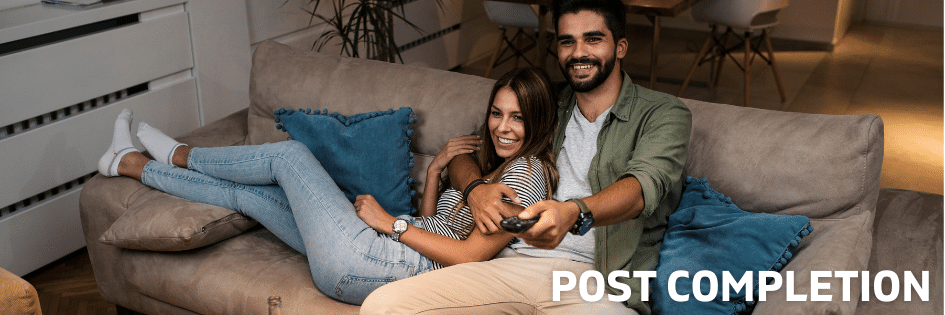
Whilst you are enjoying your new home, there is still quite a bit of work for us to do behind the scenes. Although you are now legally the owner of the property, we still need to register your ownership with the Land Registry, along with any mortgage you have taken out. We also must to pay (on your behalf) any stamp duty which is due on the purchase.
The Land Registry do take some time to deal with registrations, sometimes as long as a year! So all you need to do is sit back and relax and rest assured that we will (eventually) send to you documentation to confirm you are the new registered owners of the property, just as soon as we receive it.
After completion, we’ll:
– Register the property in your name at HM Land Registry.
– Pay any Stamp Duty Land Tax (if due) on your behalf.
– Send you a copy of the title once registration is complete.
There’s nothing you need to do at this stage, we’ll take care of everything and keep you updated.
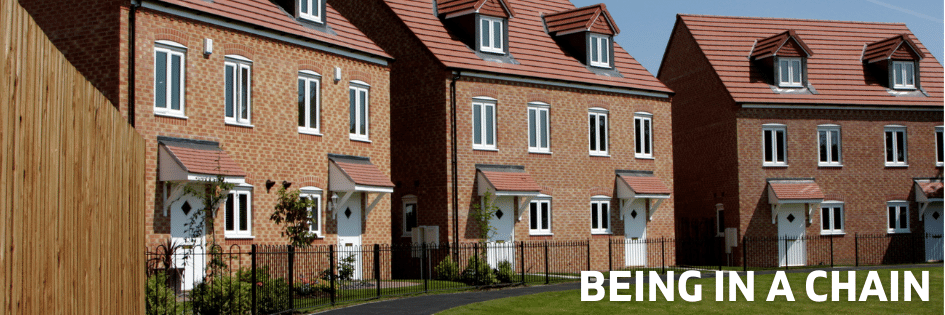
Sometimes, when you are buying or selling a property, you can be in what is known as a chain. This means that, for example, the person you are buying from needs to use the proceeds of the sale of this property to fund (or part fund) their next property.
A chain is where several property sales and purchases are linked together because each person is buying and selling a home at the same time.
For example:
You’re buying a house from someone who is also buying another house, the seller of that house may also be buying from someone else… and so on
This creates a “chain” of dependent transactions, where each sale relies on the one before it completing successfully. The longer the chain, the more people involved, and the more chance of delays.
Because everyone in the chain needs to be ready to exchange and complete at the same time, progress can only move as fast as the slowest link. If one buyer pulls out or faces a delay (e.g. with a mortgage), it can hold up the whole chain.
If you’re a first-time buyer, you’re not adding to the chain, and that’s great news! It often means you’re in a stronger position and can move quicker, which can make you more appealing to sellers. However you can be still in a chain, as people can be buying and selling on top of you.
Often chains can be long, with many people involved, and inevitably this can slow down the process. All parties in a chain must have completed of the the necessary tasks to allow the exchange of contracts and completion to occur.
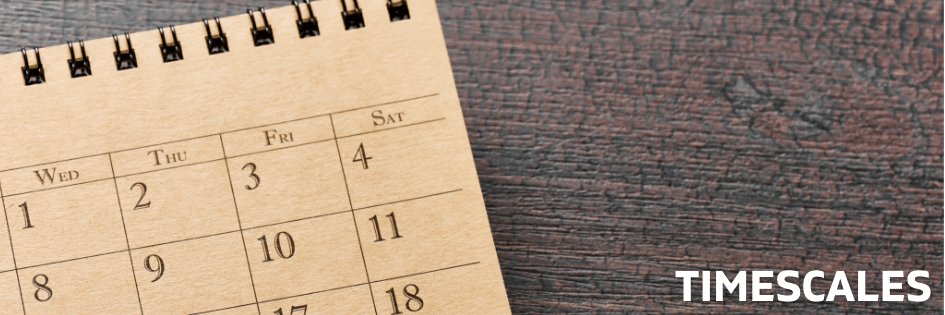
There are a number of factors which can affect how quickly things happen when you are buying a property such as:
- Being in a chain
- Delays in your searches arriving
- Delays in your mortgage offer arriving
- Management companies who take a long time to return information to your sellers
- Your sellers getting information from any companies who may have a charge registered against the property, for example a Help to Buy Mortgage or a County Court Judgement
- Your sellers not responding to enquiries quickly or accurately
- Your sellers obtaining a Grant of Probate or Letters of Administration if they are selling for someone who has died
Common delays include:
– Mortgage offers taking longer than expected
– Searches or leasehold packs taking weeks to return from local authorities or managing agents
– Chains collapsing or changing
These are often out of your (or your solicitor’s) direct control, which is why we monitor timelines closely and communicate proactively.
A stand alone purchase with no associated sale would normally take around 6 to 8 weeks but any of the above could result in delays meaning the process could take much longer. Here at Thornton Jones, we make sure that we proactively chase all parties for information, and take prompt action on any information we receive, so that we can keep any delays to a minimum. A typical transaction with a chain takes 8 to 12 weeks.

When you are buying a property with someone else (usually, but not always a partner) you typically have three options and we need to know which option best suits you and your circumstances:
- Joint tenants. This is where you jointly own the whole of the property so that if one of you dies the whole property automatically passes to the other person (outside of any arrangements you may have stipulated in your Will). This is probably the most commonly used option where both parties are contributing a similar amount of money to the purchase of the property. it is also the default option if you don’t specify differently.
- Tenants in common in equal shares. This means you each own an equal share of the property. For example, if there are 2 purchasers, you would each own 50%. If one of you dies, the other still owns their 50% share and the other 50% would pass via the estate of the person who has died either by their Will or the intestacy rules if no Will has been made. This is common where, for example, one or both of you have children from a previous relationship and you both want to ensure that your half passes to those children and not to the other owner.
- Tenants in common in unequal shares. This is similar to the above but instead of the title being held in equal shares, it is held unequally. This is common where one party has put more money into the property than the other and wishes to protect that investment. In this case you should also make a declaration of trust which clearly sets out how the property is to be held. For example, it could state that person A gets the first £50,000 (to reflect the amount they have put in) and that anything above that is divided equally. Or it could be that you agree to split the property 70%/30%, for example, in favour of one person. Whatever you have agreed we can prepare the declaration of trust to reflect the situation.
Joint Tenants
– You both own the whole property equally (no specific shares).
– If one of you passes away, the property automatically goes to the other (right of survivorship).
– Suitable for most married couples or long-term partners who want shared ownership with no distinction in shares.
Tenants in Common
– You each own a specific share in the property (e.g. 50/50, 60/40, etc.).
– If one of you dies, their share doesn’t automatically pass to the other, it goes to whoever is named in their Will.
– Common for friends, business partners, or couples with unequal contributions or individual financial plans.
Yes, it’s possible to change from Joint Tenants to Tenants in Common (or vice versa) later on, but it requires a legal process, which comes with costs. We recommend getting advice upfront so you choose the right option from the start.
Yes we recommend that anyone buying a property makes a Will, regardless of how the property is owned. Your home is a significant asset, and having a valid Will ensures it’s dealt with according to your wishes if you pass away.
This is especially important if you’re buying as Tenants in Common, because your share of the property does not automatically pass to the other owner. A Will allows you to decide who should inherit your share and avoids uncertainty or legal complications for your loved ones.
If you don’t already have a Will, our Private Client team can help you put one in place.




